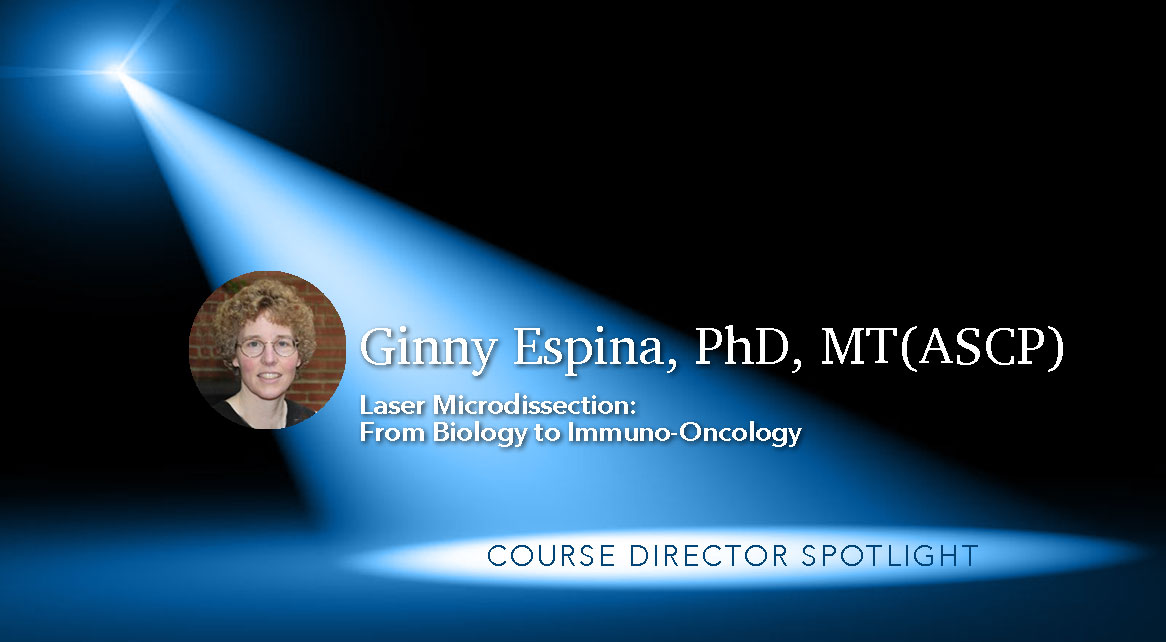
Dr. Ginny Espina is a Research Associate Professor at George Mason University’s Center for Applied Proteomics and Molecular Medicine. She will be the Workshop Director for the upcoming Bio-TracⓇ workshop, “Laser Microdissection: From Biology to Immuno-Oncology” (LCM) that runs from March 4-8, 2019.
______
The BioBuzz team had the opportunity to catch up with Dr. Espina to discuss laser microdissection and her upcoming workshop on the subject.
Tell us a bit about your background and your work in translational science.
"I am a translational medicine researcher whose career began as a Medical Technologist in clinical laboratories. My circuitous route to PhD research began 16 years ago when a former colleague invited me to see the NCI-FDA Clinical Proteomics labs at the National Institutes of Health, where she used laser capture microdissection (LCM). I had recently completed my Master’s degree in Biotechnology at Johns Hopkins University and my colleague thought I might be interested in seeing LCM. As they say, the rest is history; I was selected for an open position as the Manager of the LCM Core facility at NIH in 2002. At NIH, I trained researchers from around the world to use LCM and apply the technology to a diverse range of tissues, species and downstream molecular analyses. In 2005, our research group relocated to George Mason University (Mason) where I established our CAP/CLIA accredited clinical proteomics laboratory, including LCM. I was able to pursue my PhD while conducting basic and translational research at George Mason, all while using laser capture microdissection as the basis of my research."
What excites you about your research and the advancements happening in this the laser microdissection field?
"My philosophy towards research is “why, what if, and just try it.” This philosophy keeps the excitement in research. Even if the original hypothesis or idea did not work as expected there is always something new to learn and discover. The most exciting discoveries are exploring interconnections between seemingly disparate diseases, such as thyroid metabolism, equine laminitis and breast cancer, which is one of my current research projects.
Advancements in LCM currently include technical modifications to the instruments that enhance the instrument flexibility for various applications. The microdissection collection devices are currently being redesigned in different formats to increase the flexibility of small sample analysis. In the future, enhanced artificial intelligence for pattern recognition may allow more automated LCM processes."
What are the primary applications for LCM?
"LCM is one of the most widely applicable research technologies because it is an upstream process that does not alter the molecular content of cells. LCM is used to procure enriched populations of cells, thus eliminating interference from heterogeneous cells populations. LCM can be used for any cellular based research, in any species, for any molecule of interest. LCM is utilized for isolating nucleic acids and/or protein from plants, mammals, and even crustaceans (oysters, clams)."
What types of research is your lab focused on?
"My interdisciplinary team designs and performs basic and translational research studies and human clinical trials to elucidate potential therapeutic targets for cancer and infectious diseases. Breast cancer is a focus of our ongoing projects. Laser capture microdissection, immunohistochemistry and reverse phase protein arrays are core technologies that allow us to identify and quantify potential biomarkers in specific cell populations within the complex tissue microenvironment for each patient."
Why should a researcher attend your workshop?
"LCM is applicable to virtually any cellular based downstream assay. The ability to decipher molecular information from specific cell populations can lead to insights and discoveries that could be missed by using heterogeneous tissue specimens. Researchers can meet company representative, researchers using the technology in their own labs, and gain hands-on practical experience using a variety of LCM instruments."
Why do you enjoy leading Bio-Trac workshops?
"I enjoy teaching Bio-Trac workshops because a) the attendees are interested, motivated, and excited to learn, b) I learn about new applications and research projects using LCM, and c) the workshops are great networking opportunities."
What differentiates Bio-Trac from other training programs?
"Bio-Trac is a unique training opportunity because it brings company technical representatives and scientists together to present real-world applications, tips and techniques. Bio-Trac lectures are presented by scientists who actually use the technology and they candidly discuss its pros and cons. Bio-Trac’s fundamental strength is the hands-on training provided to each participant. The participants meet and interact with other researchers, the company representatives and the course lecturers, which can lead to collaborations and long-term networking connections."
